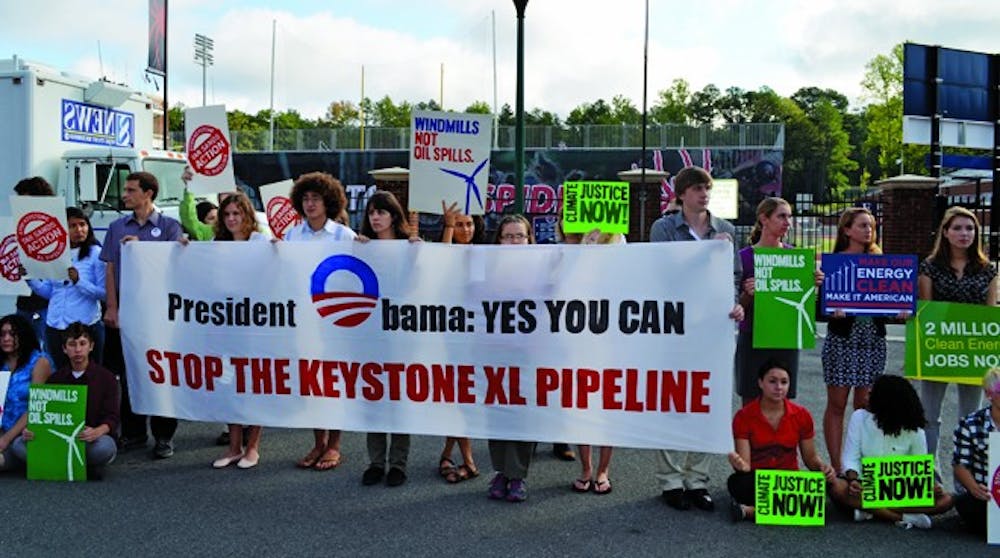It is certainly an odd situation to be in when your pen can destroy worlds, and it is a situation that our president finds himself in at this very moment. Sure, President Obama may be more concerned with the state of this economy and, of course, his re-election, but what sits on his desk right now carries considerable weight.
If signed for approval by the president, this document would issue approval for the construction of the Keystone XL tar sands oil pipeline, and would be a weapon of environmental mass destruction.
At first glance, the proposal seems like a godsend, a jobs creation miracle. In addition, U.S. oil exports would have a substantial boost, gas prices would drop, U.S. dependency on foreign oil would be mitigated and the declining Mexican oil production would be replaced.
An impulsive politician bent on U.S. growth no matter what, would approve this right away, however, for Obama, it would be an utterly unforgivable mistake.
Politically, he would lose the environmentalist vote and be considered, well, a sellout. Environmentally, (the thing that matters most) 740,000 acres of boreal forest would be destroyed, according to a New York Times editorial.
A 1,700 mile pipeline carrying the dirtiest kind of oil would be laid down from Alberta, Canada, to the Gulf Coast of Texas, according to the editorial.
Already high carbon emissions from the ongoing tar sands extraction would skyrocket, in addition to the polluted refining of tar sands in Texas.
Also, vast amounts of water would be consumed by this monstrosity of a project in Canada, because three barrels of water are needed to produce one barrel of this unconventional oil, which ends up in "tailing ponds" and contaminates surrounding clean water supplies.
No one seems to have any trust in oil companies nowadays since the BP oil spill, so why should we trust TransCanada with a potentially more destructive project?
A leak from the pipeline, which is a plausible conception given pipeline track records and the high pressure at which this crude oil is transported, could ruin some of the most valuable agricultural land and possibly contaminate one of the world's largest aquifers, the Ogallala.
Even if we could trust the pipeline not to leak, as its pre-cursor has 12 times in a year, the extraction process of bitumen -- acidic crude tar sands oil -- has already destroyed an area the size of the United Kingdom while burning 6 billion cubic feet of natural gas a day and dumping as much carbon dioxide into the air per day as 1.3 million cars, according to a Scientific American video and a Yale University article.
Now, imagine the pipeline's consumption after its production is doubled with the construction of this pipeline.We are not in the industrial revolution anymore and we should not have to destroy and pollute our land for the sake of the economy.
Enjoy what you're reading?
Signup for our newsletter
The New York Times has written articles against this pipeline, and NASA scientist and America's foremost climatologist Jim Hansen, the indigenous people of Canada, and environmental groups across the nation are against this pipeline.
This is the second largest pool of carbon in the world. Hansen says this is "game over" if we continue to tap into it. Twelve hundred people have been arrested in Washington demonstrations against the pipeline because they understand that jobs are not worth such environmental destruction.
Canada will not make changes until the U.S. does, according to the Alberta Climate Change Secretariat, so everyone needs to speak up against the Keystone XL pipeline. Your fellow students did so during Obama's visit to campus, and you should do so as well.
Go to tarsandsaction.org to save our country and our planet.
Support independent student media
You can make a tax-deductible donation by clicking the button below, which takes you to our secure PayPal account. The page is set up to receive contributions in whatever amount you designate. We look forward to using the money we raise to further our mission of providing honest and accurate information to students, faculty, staff, alumni and others in the general public.
Donate Now


